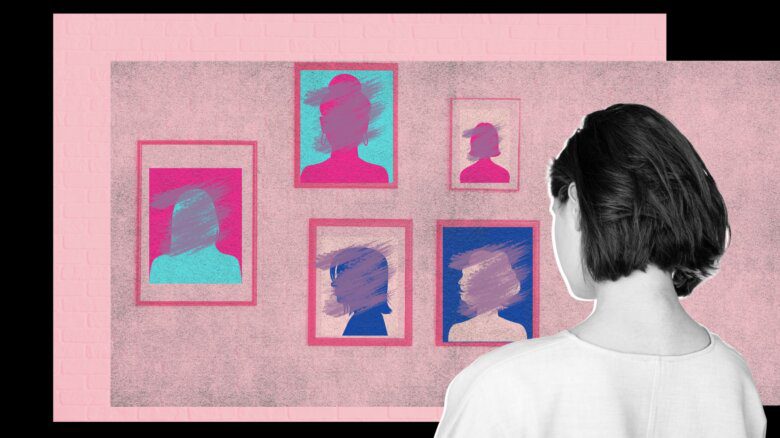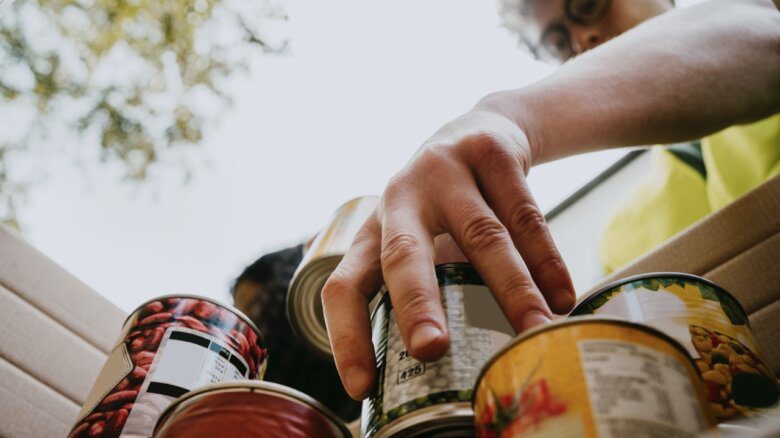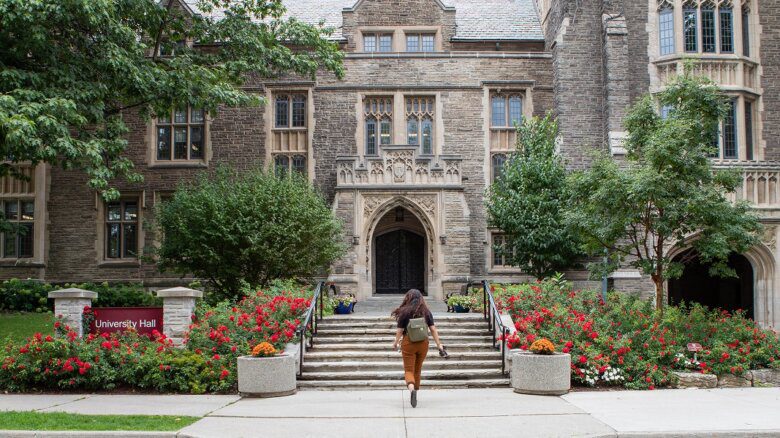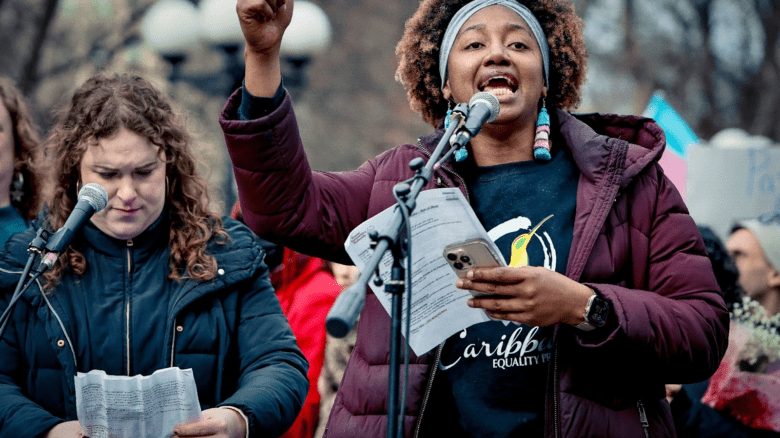Talking to Xtra from Lviv, a city of more than 700,000 in the west of Ukraine, Tymur Levchuk has to end the call suddenly. The city has been considered a safe distance from Russia attacks, but an airstrike alert sounded on his phone. He and his husband have to find a safe place to wait out a possible bombing. The day before we spoke, the Russian military had bombed a military base about 50 kilometres away from the city, killing at least 35 people and injuring 134 more.
“We heard it. I didn’t see it but I heard it. It was very strange,” says Levchuk, executive director at Fulcrum, an LGBTQ+ advocacy organization founded in 2009. The organization had been based in the capital Kyiv, but Levchuk and his partner have been doing their work from Lviv since the start of the war. Several days after our conversation, on Mar. 18, Russians bombed an airplane repair facility near the city’s airport.
Fulcrum is normally dedicated to lobbying the government and educating the public about LGBTQ+ issues, as well as providing health and support services to queer and trans people themselves. But since Feb. 24, when Russia invaded Ukraine, Levchuk, Fulcrum and most other LGBTQ+ organizations in the country have had to shift gears, focusing their attention on the most immediate needs of the people they represent: food, shelter, medication and, most of all, safety. Their lobbying efforts have also shifted from persuading their own government to support LGBTQ+ rights to persuading foreign governments, like Canada, the United States and European Union countries, to take queer and trans people into consideration when providing humanitarian aid and welcoming refugees.
“Of course we really thank you for support for the Ukrainian Army and for humanitarian aid, but it’s really important to our government, president and the other presenters to hear about LGBTQ+ community and other groups,” says Levchuk. “They have to understand that protection for LGBTQ+, it’s part of a democratic liberal country where people respect human rights.”
Ukrainians fleeing Russian attacks in the east and in the capital have fled not only to neighbouring countries like Poland, Moldova and Romania, but have also flooded into Lviv. Within a week of the beginning of the war, Fulcrum opened a shelter for 15 people and has since opened another with 18 more spots for LGBTQ+ people who have come from various embattled regions of Ukraine. These shelters are repurposed office spaces and require the installation of furnaces, washing machines, showers and other comforts to make them liveable. Getting supplies has been a challenge because stores are closed or shelves are empty; the Fulcrum team must rely on tips to find where to buy mattresses and bedding. But on the other side of the coin, it’s almost impossible for refugees to find a place on their own.
“To rent an apartment here, it’s super difficult, especially if you’re a man. People prefer to offer their apartment for rent to women with children. LGBTQ+ shelters provided by LGBTQ+ organizations are the only option they have unless they have friends or relatives here,” says Levchuk.
“Prices of food and medication have risen. People are really struggling.”
Fulcrum has also been providing people with money for food, and has been working with local health organizations to help people access medication, whether hormones for trans people or antiretrovirals for HIV-positive people. The government has been making HIV medication freely available—but only after a week’s wait. Volunteers donate cash and prescriptions to cover the week for people. Hormones have also been made available through humanitarian aid and are being distributed by volunteers. Fulcrum has also paid for taxis to evacuate people out of harm’s way.
Andrii Zarytskyi, subdivision manager of the LGBTQ+ association LIGA, says his organization has helped more than 50 people get to safety, including to the borders with Moldova, Romania and Poland, and has provided money to 220 people, most of whom have lost their jobs because of the war. “Prices of food and medication have risen,” says Zarytskyi. “People are really struggling.”
At the beginning of the war, Zarytskyi relocated from embattled Mykolaiv to Odessa, then to Moldova, where he is now based. “First of all, I think about: What to do next? You just don’t know what to do next. I still have a cat at home who is at my friend’s house right now. It’s still a really difficult decision to stay here in Moldova. I’m trying to do everything I can for the organization, for the community. But, you know, I really want to go home because that is where my heart is, where my soul belongs.”
Zarytskyi says that LIGA’s four offices, including three community centres, have been partly closed. The organization has been mostly providing counselling and support services online, something they adapted to doing during the COVID-19 pandemic. In their clinic in Odessa, a coastal city in the southwest that has not yet come under direct attack, they have been able to offer something like normal in-person access. “People are coming just to talk to someone because they don’t want to be alone right now,” he says.
“I really want to go home because that is where my heart is, where my soul belongs.”
But in Mykolaiv, a city of about 500,000 that’s being shelled five or six times a day, connecting people with services and medication has become very difficult. “People usually try to stay away from the streets when they hear the sirens or the shelling sounds or the bombing sounds,” says Zarytskyi. Getting the aid to where it’s needed has been a real struggle.
KyivPride, normally in charge of organizing an event that’s both festive and political, has become something of a national hub organization, helping LGBTQ+ organizations around the country better co-ordinate the services they’re providing and acting as a clearing house for information. While Pride organizations in North America and Western Europe can be seen as party planners, Pride in Ukraine has remained political; its leadership has organizational power, access to a large national network and connections to Pride organizations worldwide.
Still, it can be hard to get solid information about what’s happening. While there have been reports of a gay activist in Kharkiv being killed by Russian bombs, it’s not something LIGA has been able to confirm. The city of Mariupol, with a population of almost 500,000, has been virtually cut off from the rest of the country—physically and digitally—making it hard to direct aid there or even determine what’s needed.
Lobbying the government remains part of the job of these activists. There have been reports of trans women prevented from crossing the border by Ukrainian border guards because their identification marks them as male (most men are required to stay in the country to be able to fight the war). “We talked with the Foreign Ministry and they know about this problem for transgender persons who can’t leave Ukraine because of these male markers,” says Levchuk. This month, the Ministry of Social Protection introduced a policy that male-identified people with disabilities can leave the Ukraine, but it’s unlikely that LGBTQ+ people would automatically be included under this umbrella.
Much of the aid to Ukraine passes through large nongovernmental organizations, including religious organizations which may not be especially sympathetic to or knowledgeable about LGBTQ+ communities. Last week the organization Dignity Network Canada issued a letter to Canada’s Minister of International Development asking that the humanitarian aid Canada is providing to Ukraine be delivered in ways that’s accessible to LGBTQ+ communities. Dignity Network is a group of 53 civil society organizations across Canada involved in supporting international human rights regardless of sexual orientation, gender identity and expression and sex characteristics. “We acknowledge that the Government of Canada has already recognized the importance of supporting LGBTQI communities in the country… but the results of that work will be threatened without sustained emergency support,” states the letter. “Canada should ensure that humanitarian aid mechanisms are aware of the particular needs and issues impacting LGBTIQ people, both in Ukraine and in the border countries, where people have fled for asylum.”
In recent years Ukraine has developed a vibrant and growing LGBTQ+ civil society, says Dignity Network CEO Doug Kerr. “It’s not secret that this is one of the issues between Russia and Ukraine. There’s been a growing Pride movement in many communities, improvements in sexual health, in HIV/AIDS services,” says Kerr. “And Canada is one of the few countries that says it wants to support LGBTQ+ communities there, so Canada has a role. I think a phone call or an email to your MP asking that Canada to do more to support the LGBTQ+ in Ukraine can have a huge impact. A lot of folks don’t know a lot about Canadian aid and how it goes out, but if Canada could be one of those countries to get aid to LGBTQ+ communities, people with HIV, that could be powerful.”
Then there’s helping Ukrainians who have left the country. Canada has come under increasing pressure, and has made moves to make it easier for refugees leaving Ukraine to come to Canada. But it’s still Ukraine’s closest neighbours who are doing the heavy lifting. Slava Melnyk, the Ukraine-born CEO of Warsaw-based Campaign Against Homophobia, says his organization has been sending volunteers to the border with Ukraine to provide information to LGBTQ+ arrivals: where they can find shelter, how they can get access to medication and find support from various Polish LGBTQ+ organizations. Poland is known as one of the least LGBTQ+ friendly members of the European Union, so although it has been supportive of its neighbour, its official policies are not especially welcoming to LGBTQ+ people.
“It’s not necessarily the case that people who come to Poland stay in Poland or want to stay in Poland. It’s difficult to keep track of things,” says Melnyk.
After the war started, Melnyk says the pharmacist association of Poland issued a notice that prescriptions from other countries, including Ukraine, be respected and that some medications can be supplied without prescription. The Polish health care system allows Ukraine nationals free access to public health care, “but the issue we see that has to be addressed is that this system applies only for Ukraine nationals, but not people of other nationalities who were in Ukraine when the war started. There is no access to medical care for, for example, refugees from Afghanistan who were living in Ukraine when the war started,” he says.
“If Russia’s soldiers occupied some city, they will also be looking for LGBTQ+ activists, human rights activists and journalists.”
Although Ukrainian society has broadly rallied to its country’s defence, LGBTQ+ activists are particularly motivated to push back against Russian invasion. “Because you understand if Russia’s soldiers occupied some city, they will also be looking for LGBTQ+ activists, human rights activists and journalists,” says Levchuk. “For my colleagues in Kyiv now, it’s a difficult decision because they have to think about what happens if they’re occupied by Russians.”
If Russia is able to take control of Ukraine, there is reportedly a “kill list,” including journalists and human rights activists, who would be targeted by the Kremlin. Life in a Russian-controlled Ukraine would not just be more oppressive for LGBTQ+ people, it would become more dangerous.
“I think that that is the biggest threat, probably, hanging over all of our heads. I worry about people who have stayed in Ukraine and who are more active,” says Zarytskyi, who, along with the other activists interviewed for this story, agreed to let his name be published. “They will be at risk.”
Check out our story on how to help LGBTQ+ people in Ukraine.


 Why you can trust Xtra
Why you can trust Xtra


